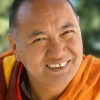
After Lama Thubten Yeshe gave a lecture on April 28, 1975 in Brisbane, Australia, he answered questions from the students in attendance.
The preceding talk can be found here.
Q: Lama, were you saying that we should express rather than suppress our negative actions, that we should let the negativity come out?
Lama: It depends. There are two things. If the negative emotion has already bubbled to the surface, it’s probably better to express it in some way, but it’s preferable if you can deal with it before it has reached that level. Of course, if you don’t have a method of dealing with strong negative emotions and you try to bottle them up deep inside, eventually that can lead to serious problems, such as an explosion of anger that causes someone to pick up a gun and shoot people.
What Buddhism teaches is a method of examining that emotion with wisdom and digesting it through meditation, which allows the emotion to simply dissolve. Expressing strong negative emotions externally leaves a tremendously deep impression on your consciousness. This kind of imprint makes it easier for you to react in the same harmful way again, except that the second time it may be even more powerful than the first. This sets up a karmic chain of cause and effect that perpetuates such negative behavior.
Therefore, you have to exercise skill and judgment in dealing with negative energy, learn when and how to express it and, especially, know how to recognize it early in the piece and digest it with wisdom.
Q: Could you please explain the relationship between Buddhist meditation techniques and hatha yoga?
Lama: In Buddhism we tend to focus more on penetrative introspection than on bodily movement, although there are certain practices where the meditation techniques are enhanced by physical exercises. In general, Buddhist meditation teaches us to look within at what we are, to understand our own true nature. All the same, Buddhist meditation does not necessarily imply sitting in the lotus position with your eyes closed—meditation can be brought into every aspect of your daily life. It is important to be aware of everything you do so that you don’t unconsciously harm either yourself or others. Whether you are walking, talking, working, eating…whatever you do, be conscious of the actions of your body, speech and mind.
Q: Do Buddhists control their prana [wind energy] completely through the mind?
Lama: Yes. If you can control your mind, you can control anything. It’s impossible to control your physical body without first controlling your mind. If you try to control your body forcibly, if you pump yourself up with no understanding of the mind-body relationship, it can be very dangerous and cause your mind great harm.
Q: Can you reach as deep a state of meditation through walking as you can through sitting?
Lama: Sure, it’s theoretically possible, but it depends upon the individual. For beginners, it is obviously much easier to attain deeper states of concentration through sitting meditation. Experienced meditators, however, can maintain single-pointed concentration, a fully integrated mind, whatever they’re doing, including walking. Of course, if someone’s mind is completely disturbed, even sitting meditation may not be enough for him to integrate his mind.
One of the hallmarks of Buddhism is that you can’t say that everybody should do this, everybody should be like that; it depends on the individual.
However, we do have a clearly defined, step-like path of meditation practice: first you develop this, then you move on to that, and so on through the various levels of concentration. Similarly, the entire path to enlightenment—we call it the lam-rim—has been laid out in a graded, logical fashion so that each person can find his or her own level and take it from there.
Q: Lama, can the various negative thoughts that arise in our minds come from a source outside of ourselves, from other people, or perhaps from spirits?
Lama: Well, that’s a very good question. The real source, the deep root of negativity, lies within our own minds, but for this to manifest usually requires interaction with a cooperative, environmental cause, such as other people or the material world. For example, some people experience mood swings as a result of astrological influences, such as the vibration of planetary movement.
Others’ emotions fluctuate because of hormonal changes in their bodies. Such experiences do not come from their minds alone but through the interaction of physical and mental energy. Of course, we would also say that the fact that we find ourselves in a body susceptible to this kind of change originally comes from our minds. But I don’t think Lord Buddha would say that there is some outer spirit harming you like that. What is possible is that your inner energy is relating to some outer energy, and that it is that interaction that makes you sick.
You can see from your own life experiences how the environment can affect you. When you’re amongst peaceful, generous, happy people, you’re inclined to feel happy and peaceful yourself. When you’re amongst angry, aggressive people, you tend to become like them. The human mind is like a mirror. A mirror does not discriminate but simply reflects whatever’s before it, no matter whether it’s horrible or wonderful.
Similarly, your mind takes on the aspect of your surroundings, and if you’re not aware of what’s going on, your mind can fill with garbage. Therefore, it is very important to be conscious of your surroundings and how they affect your mind. The thing that you have to understand about religion is how your religion relates to your own mind, how it relates to the life you lead. If you can manage that, religion is fantastic; the realizations are there.
You don’t need to emphasize belief in God, or Buddha, or sin or whatever; don’t worry about all that. Just act out of right understanding as best you can and you’ll get results, even today. Forget about super consciousness or super universal love—universal love grows slowly, steadily, gradually. If, however, you’re just clinging to the notion, “Oh, fantastic! Infinite knowledge, infinite power,” you’re simply on a power trip. Of course, spiritual power really does exist, but the only way you can get it is by engaging in the proper spiritual actions.
Power comes from within you; part of you becomes power, too. Don’t think that the only true power is up there, somewhere in the sky. You have power; your mind is power.
Q: Perception is one of the five aggregates that, according to Buddhist philosophy, constitute a person. How does it work?
Lama: Yes, that’s another good question. Most of the time, our perception is illusory; we’re not perceiving reality.
Sure, we see the sense world—attractive shapes, beautiful colors, nice tastes and so forth—but we don’t actually perceive the real, true nature of the shapes, colors and tastes we see.
That’s how most of the time our perception is mistaken. So our mistaken perception processes the information supplied by our five senses and transmits incorrect information to our mind, which reacts under the influence of the ego. The result of all this is that most of the time we are hallucinating, not seeing the true nature of things, not under- standing the reality of even the sense world.
Q: Does past karma affect our perception?
Lama: Yes, of course. Past karma affects our perception a lot. Our ego grasps at our uncontrolled perception’s view, and our mind just follows along: that entire uncontrolled situation is what we call karma. Karma is not simply some irrelevant theory; it’s the everyday perceptions in which we live, that’s all.
Q: Lama, what is the relationship between the body and mind as far as food is concerned.
Lama: Body is not mind, mind is not body, but the two have a very special connection. They are very closely linked, very sensitive to changes in each other. For example, when people take drugs, the substance doesn’t affect the mind directly. But since the mind is connected to the body’s nervous system and sense organs, changes induced in the nervous system by the drug throw it out of harmony and cause the mind to hallucinate. There’s a very strong connection between the body and the mind. In Tibetan tantric yoga, we take advantage of that strong connection: by concentrating strongly on the body’s psychic channels we can affect the mind accordingly. Therefore, even in everyday life, the food you eat and the other things your body touches have an effect on your mind.
Q: Is fasting good for you?
Lama: Fasting is not all that important unless you are engaged in certain special mind training practices. Then, fasting may even be essential. This is certainly the lamas’ experience. For example, if you eat and drink all day and then try to meditate in the evening, your concentration will be very poor. Therefore, when we’re doing serious meditation, we eat only once a day. In the morning, we just drink tea; at midday we have lunch; and in the evening, instead of eating, we again drink tea.
For us, this kind of routine makes life desirably simple and the body very comfortable; but for someone not engaged in mind training, it would probably feel like torture. Normally, we don’t advocate fasting. We tell people not to punish themselves but simply to be happy and reasonable and to keep their bodies as healthy as they can. If your body gets weak, your mind becomes useless. When your mind becomes useless, your precious human life becomes useless.
But on special occasions, when fasting enhances your meditation practice, when there’s a higher purpose, I would say yes, fasting can be good for you.
From Lama Yeshe’s Becoming Your Own Therapist, a series of lectures given in Australia and New Zealand in 1975. Edited by Nicholas Ribush. Freely available from the Lama Yeshe Wisdom Archive.
Love elephant and want to go steady?
Sign up for our (curated) daily and weekly newsletters!
Editor: Bryonie Wise
Photo: courtesy of the Lama Yeshe Wisdom Archive











Read 1 comment and reply